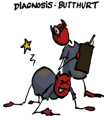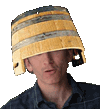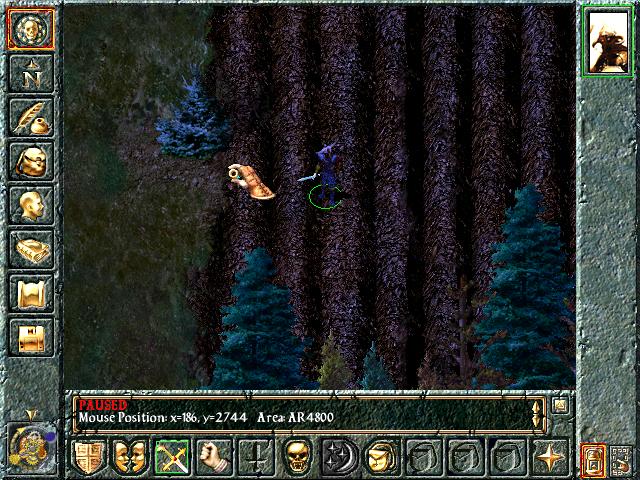The basic features of exploration are moving around, scanning the area around you, and finding things of interest.
The basic feature of exploration in a video game is maintaining interest in the area you are traversing, which is impossible to do when you can neither appreciate your character's movement through landscape due to the static bids-eye view of isometric 2D, nor remain invested in the encounters because the absolute majority of them are extremely generic out-of-context fetch quests or quirky pop-culture references (plenty of examples above). Since traversing the maps of BG1 offers no challenges and no quality storytelling, it is reduced to a tedious process of clearing the fog of war.
BG1 definitely has those. You are constantly making judgements as to where you are headed next, both in terms of maps, and inside each one
You do not have to make any judgement as to where you are headed next in the absolute majority of outdoor locations in Baldur's Gate because each map is a rectangular flat surface which needs to be cleared of the fog of war before you can be certain you are not missing any encounters. There are very few maps which require active judgement as to where you should be headed next, these include Gnoll Stronghold and Durlag's Tower, almost of the others are identically-shaped flat surfaces which are traversed in exactly the same way - run across perimeter and finally venture into the center. Following any other trajectory will inevitably result in numerous chunks of the map obscured by the fog of war, require incredible amounts of backtracking, and further inflating the already tremendous tedium.
I am glad you removed the pop-culture bit out of the quirky out of context label, it's a step in the right direction, the quirky and out-of-context bits should follow next. Most points of interest are neither particularly quirky nor out-of-context in terms of the game world. In a manner similar to most of your arguments, you've erected this strawman of in-context meaning relevant to the specific zone, whereas I (and I suspect many others) would simply define in-context as being relevant to the game world.
I will answer the rest of your incredibly vapid and pointless post later, but first off, what the hell are you even talking about calling my argument a "strawman"? Is strawman your universal euphemism for "poopy-head" that you use regardless of the term's actual meaning? Because you know, strawman actually means something. Specifically, a strawman is a deliberate misrepresentation of your opponent's argument that makes it easier for you to maintain the pretense of having a valid point, which is what you are doing every time you ignore numerous essential parts of my post and focus on misrepresenting selected lines ripped out of their context. Whether you agree with my definition of out-of-context encounter or not, it is not a strawman, because it is not a misrepresentation of your argument. Nor is it a correct interpretation of your argument. It is in fact NOT YOUR ARGUMENT TO MAKE, it's mine. I was originally the one to suggest that most of BG1's encounters are out-of-context randomness that has nothing to do with its location, and you were the one to disagree with that. Stop saying "strawman" whenever you don't like something and have nothing better to say, it's not a generic insult. Words mean things. Period.
I am glad you removed the pop-culture bit out of the quirky out of context label, it's a step in the right direction, the quirky and out-of-context bits should follow next. Most points of interest are neither particularly quirky nor out-of-context in terms of the game world. In a manner similar to most of your arguments, you've erected this strawman of in-context meaning relevant to the specific zone, whereas I (and I suspect many others) would simply define in-context as being relevant to the game world. Zone based context is better than world based context in absolute terms of course, but the latter is more than enough to make encounters not feel out of context or random. Since, as I already mentioned before, this is more of an open world game and not a tight story driven one like PS:T, and NPCs have to be spread out over a much larger world, with emptiness actually positively contributing to exploration by proving contrast, the fact that the encounters aren't always tightly related to other encounters in the same zone does not diminish my enjoyment of the exploration aspects of the game. Would BG1 have been better if every encounter in every optional zone had a lengthy bit of dialogue and was tied in to every other encounter in that zone? Probably (as long as there weren't too many per zone, since this would kill the feeling of exploration). But what it did have in terms of variety, uniqueness, humor, player reward(loot), and beauty (vistas) was more than enough for me to enjoy the exploration aspect.
Since the game world is a city and surrounding countryside of Forgotten Realms, a generic high fantasy theme park that has EVERYTHING its numerous authors could be bothered to cram into it, you are making the argument very easy for yourself, because pretty much any sort of quirky randomness Bioware opts to include in the game world will be in some way connected to it. When your world is a faceless hunk of pseudo-medieval randomness, your standards for what counts as an in-context encounter are reduced down to floor level, which definitely counts as a butthurt fanboy's desperate last line of defense, but is not the approach that leads to quality storytelling. The task of defining a game world and giving it its own unique identity lies on the shoulders of the game developing team regardless of whether they are doing their own setting, or basing it in someone else's. Since virtually every optional area in BG1 is about as faceless and interchangeable as the other, it is only natural that just about every encounter is as generic and interchangeable as the other. You may subjectively enjoy tearing through 20 pieces of the countryside filled with 100 generic fetch quests, but that is the problem of your level of mental development. Quality storytelling requires higher standards that random paladins asking you to kill random gibberlings in a random forest in exchange for random loot - none of these elements are connected with each other, they come out of nowhere and vanish into nothing. What you in the depths of your dementia call "low-key encounters hit ass and legs omg itz heaven" normal people would call "lazy-ass bullshit".
So yeah, quality storytelling requires the game world to have locations with an identity and to be composed of elements that are meaningfully connected to each other, as well as said identity. You know who else agrees with me? BIOWARE. Bioware agrees with me. How do I know this? Because in Baldur's Gate 2 Bioware completely dropped the "20 generic maps" system and instead opted to reduce the total number of areas in exchange for making each area more interesting, giving each area its own unique identity, face, and place in the world, populating them with encounters and quests that have a reason for being in that particular area rather than being perfectly interchangeable. This is why in BG1 the Baldur's Gate city is composed of completely faceless segments that can only be defined according to their geographic position (north-west, north-east, center, south) and therefore contain completely generic encounters that can just as easily be swapped around with no logical problems arising, whereas in BG2 the city of Athkatla has a Merchant district, a Dock district, a Government district, and so on - each district was given its own identity in order to create more integrated encounters and improve storytelling quality. This is why in BG2 when you travel to Whiny Girl's Keep you do not have to traverse 20 generic country-side maps, but rather travel directly to Whiny Girl's Keep and begin exploring an outdoor location that actually has relevance to the game's (side-) storyline, a backstory that explains its current state (there's actually a reason it is overrun by trolls), and after you are done exploring you can make a few choices which will change the location's state accordingly. Identity, backstory, and impact - all the things that are missing from BG1.
You think these things are all a complete coincidence, or are you simply too big of a butthurt fanboy to analyze the difference between BG1 and its sequel, and decide that since you remember yourself enjoying playing BG1 in your youth when grass was greener and water was wetter, then it must automatically be the bestest thing evah that is beyond criticism and having flaws? Baldur's Gate 1 was Biowhore's first and very ambitious attempt at making a roleplaying game, it was very good for what it was in its own time period and raised the standards for CRPG to a new level, however it also suffered from a number of flaws that make it a questionable candidate for replaying. These flaws/shotcomings include a very primitive dialogue system - many dialogues are simply a paragraph of exposition with the "end dialogue button" which doesn't even let your character say anything, and even when you can the dialogue options are rarely interesting enough, a near-total lack of interaction with party members, and, of course, A TEDIOUS AND REPETITIVE PROCESS OF TRAVERSING FACELESS GENERIC AREAS POPULATED BY OUT-OF-CONTEXT QUIRKY ENCOUNTERS THAT WERE COMPLETELY INTERCHANGEABLE WITH ONE ANOTHER BECAUSE OF HOW LITTLE THEY HAD TO DO WITH THEIR PLACEMENT. They fixed these flaws to various degrees of success in the game's sequel, which is why it is BG2 that is usually lauded as an example of a CRPG done right that more than lives up to modern standards of computer roleplaying, rather than BG1 which hasn't aged well in terms of storytelling quality.
Yet another statement based on your own biases and assumptions. Have you considered that what engages others might be different than what engages you, and that for many people, the combination of encounter variety, combat, and the beautiful 2D maps was very engaging?
Have you considered that the reason we are getting one shitty-ass RPG like Oblivion, Faggout 3, Faggot AIDS and Ass Defect after another today is because, while
nerds intelligent people are engaged by quality storytelling, unique game-world, complex story, interesting characters, and choices&consequences, OTHERS (morons) are more interested in playing as an awesome-ass guy who throws bad-ass lightning at nasty-ass monsters to get epic-ass Sword of Trembling Anuses? Have you considered that most gamers that purchase roleplaying games today are not even capable of thinking in terms of "my character is this and that, he likes that and this, and in this circumstance would choose to do this but definitely not that", and rather seek ways of exploiting the game engine to get most experience, bestest loot, Achievement "Sucked 20 Dicks for Money" and reach 130% accomplishment status? Have you considered that someone who claims to enjoy traversing faceless generic maps filled with out-of-context quirky encounters just because OOOOOHHH LOOOOK PRETTY MAPSES LOW KEY HITTING ASS AND LEG is either not very honest with himself, or has extremely shallow tastes in storytelling/roleplaying?
Secondly, as I already mentioned, your constant reference to PS:T in regards to BG1 exploration is just silly. You cannot make points about a game system in game A by bringing up game B that doesn't really have that system. Planescape Torment had almost no exploration.
What's silly is that, despite having no arguments and no examples to the contrary, you keep using tendentious language to maintain a pretense of having a point. First off, even by your own extremely shallow and incorrect standards, Planescape Torment had plenty of exploration. This is what you said: "The basic features of exploration are moving around, scanning the area around you, and finding things of interest." PST didn't let you move around? PST didn't let you scan the area around yourself? PST didn't let you find things of interest? It did? THEN WHAT THE FUCK ARE YOU DOING CLAIMING PST HAD ALMOST NO EXPLORATION, EVEN YOUR STATEMENT DIRECTLY CONTRADICTS THIS CRETINOUS CLAIM.
Second, just because the majority of PST was set in one city and had little to no country-side to explore, it doesn't mean PST had no exploration. PST had a number of large and highly unique city areas - four Hive Ward Areas, Ragpicker Square, underground village, dead warrens, Lower Ward, Clerk Ward, Curst, Carceri, two Mazes, and many other both exterior and interior areas, and even Outlands and Baator which, despite being empty of optional encounters, gripped your interest through the sheer surrealism and uniqueness of their landscape and culminated in extremely story-relevant, highly memorable, and rich in storytelling/roleplaying potential encounters with Fjhull Forked-Tongue and the Pillar of Skulls (especially with Morte around). So yeah, Planescape Torment had exploration - plenty of it, and richly saturated with encounters that were logically integrated into the game world in a manner that was more than very basic, primitive, and generic like in BG1 - yeah, I'm sure the first thing you thought to yourself after getting fedex quest from a random girl/farmer/knight in a random location was "Wow, this world has little girls, farmers and knights - I am learning so much today!"
Third, I don't even need to compare BG1 with PST, because I can simply compare BG1 to BG2. BG2 isn't the only example of Bioware borrowing a storytelling system from a Black Isle/Obsidian game for one of its future titles and getting high praise for something they did not originally come up with, but in any case, the sequel greatly benefited from reducing the total number of its optional generic areas and replacing them with well-crafted unique areas. I could just as easily draw a comparison between a random area from BG1 and BG2, and guess which game will have fewer out-of-context quirkiness?
It the same's as if I started critiquing ToEE combat by bringing up PS:T's combat, because you know, Sigil is better designed than Hommlet. PS:T is great in terms of writing and integration of dialogue into the game and quest design and all that, but no one would suggest it for people looking for either a good exploration or combat game, so please stop beating this dead horse.
What? Seriously, what? Wh... what? WHAT?!
WHOOOOOTTT??!
Did you just say, concluding that exploration of Sigil was much better than exploration of Baldur's Gate because Sigil was a much better designed area than Baldur's Gate is directly equivalent to concluding that PST had better combat than ToEE because Sigil was a much better designed area than Hommlet? You're an idiot. The quality of exploration is directly dependent on the quality of area design and the quality of writing/storytelling/roleplaying opportunity invested in that area. Combat, however, is a completely separate system that does not depend on the quality of level design, and by the way, ToEE did have better combat than PST - most games do, in fact. Combat isn't PST's strong feature, which has absolutely buttfuck nothing to do with any single part of this argument.
First of all, you should try to relax. Your anger seems to be growing the longer this discussion goes on, and I wouldn't want you to explode and beat up your cat or something in a violent fit of nerdrage. Remember, it's just video games.
Nobody gives a shit about your huffy-puffy rhetorics. Either provide rational arguments, or don't argue. Actually, since virtually all of your post can be summed up as "LEAVE BALDUR'S GATE ALONE I LIKED LOOKING AT PRETTY MAPS", I'm not going to bother writing a response unless you post something that doesn't require me to constantly repeat myself for the trillionth time. Which, considering how big of a butthurt fanboy you are, is likely not going to happen.
Now go clean yourself up, moronic butthurt fanboy. I'm tired of explaining the blindingly obvious.
I must aplaude your diligence and long ass winded retorts Glyphwright but why all the anger? BG must have you waking up in feverish nightmares with its poor design or something but take it easy buddy...it is just a game right and it is supposed to be fun, just calm down son. You must be stuck in your basement under a snowfall drinking vodka and wishing you where at the beach or sucking under a huge pair of tits (or balls depending your tastes) but take it easy on probably one of the few channels of comunication you might have...I could only imagine your loss if the Codex banned your ass for your raging badassery
I am known as Glyphwright, slayer of dumbfucks, terror of butthurt fanboys.














































